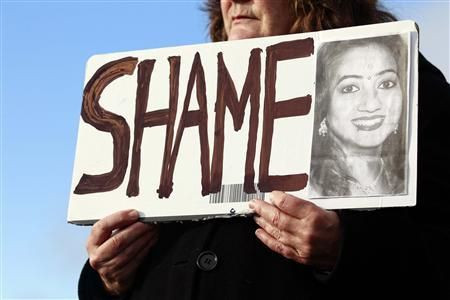Indian Woman's Death Prompts Outrage And Soul-Searching In Ireland Over Abortion Ban

It took the death of an Indian woman to make the Republic of Ireland rethink its near-total ban on abortion.
Savita Halappanavar, a 31-year-old woman, died in a hospital in Galway three weeks ago after staff refused her request for an abortion in the 17th week of her pregnancy. She had complained of severe back pains and worried she would miscarry, but hospital staff rejected her entreaties, leading to her untimely death from septicaemia (blood poisoning).
Savita's death has sparked condemnation from as far away as India and within Eire itself over the Republic's strict abortion laws. Catholic Ireland is one of the few remaining nations in the European Union where abortion is essentially illegal. Technically, abortions are allowable in cases where the mother's life is deemed at-risk, but even in such circumstances, terminations may not occur.
The Indian ambassador to Ireland, Debashish Chakravarti, has expressed his regrets over Savita's unnecessary death and urged the Irish government to clarify its laws governing reproductive rights and proceed immediately with investigations into the tragedy.
Along with protests across Ireland and Britain over the death, Indian media lamented Irish antiquated abortion laws. An editorial in the Times of India newspaper said Ireland's "ban on abortion ... ended up taking a life that need not have been lost. How does that square with viewing the ban as 'pro-life'?"
In a column in Britain's Guardian newspaper, Goretti Horgan, a pro-choice activist from Northern Ireland, demanded that Ireland overhaul its abortion legislation, citing that too many pregnant Irish women risk their lives by having unwanted babies or journeying to England to have an abortion.
“Many working-class Irish women, unable to afford to pay for a private abortion in England, buy pills from the Internet and self-induce abortions,” she wrote.
“In 2012, abortion is part of Irish life. ... Public opinion [in Ireland] is largely pro-choice. What's needed is another referendum: this time to allow easier access to abortion.”
Patrick Nulty, an Irish Labour deputy in the Dáil (parliament), said Halappanavar's death called for a "pressing and urgent need" for parliament to reforming the abortion law.
"The heartbreaking tragedy of the death of Savita Praveen Halappanavar is something which should cause every citizen in our republic to pause and reflect," he said.
The Irish government is preparing a report on how to reform the country's abortion laws in response to a 2009 European court ruling, which said Ireland's ban on abortion violated women's rights.
© Copyright IBTimes 2024. All rights reserved.





















